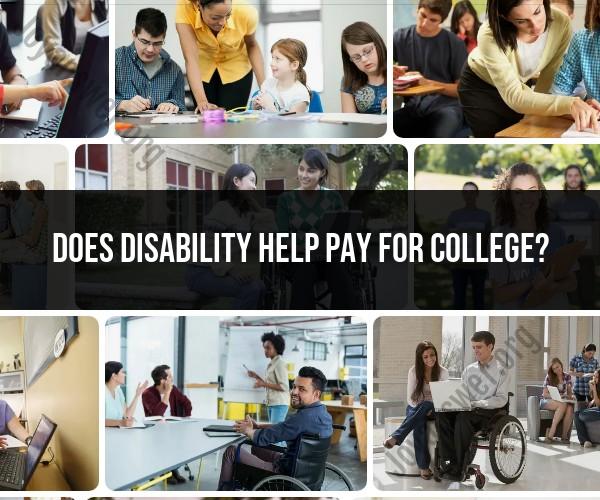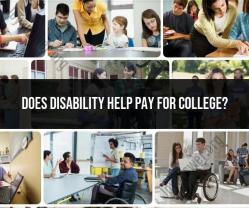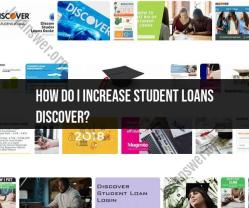Does disability help pay for college?
Yes, having a disability can provide opportunities to help pay for college. There are several ways in which individuals with disabilities can access financial support for higher education. Here's a guide on financing college with disabilities:
Federal Financial Aid: All students, including those with disabilities, can apply for federal financial aid by completing the Free Application for Federal Student Aid (FAFSA). Federal aid programs, such as Pell Grants and federal student loans, can provide financial assistance to cover tuition, books, and living expenses. Additionally, students with disabilities may qualify for specific federal grants, such as the Federal Supplemental Educational Opportunity Grant (FSEOG), if they demonstrate exceptional financial need.
Scholarships and Grants: Many organizations, both public and private, offer scholarships and grants specifically for students with disabilities. These awards may be based on academic merit, community involvement, or the type of disability. Some well-known organizations that provide such scholarships include the National Federation of the Blind, the Autism Society, and the American Association on Health and Disability.
State Assistance Programs: Some states have programs that provide financial aid and support services for students with disabilities. These programs may include tuition assistance, vocational rehabilitation services, or disability-specific grants. Check with your state's higher education agency or department of education for more information.
Work-Study Programs: The Federal Work-Study program offers part-time job opportunities for undergraduate and graduate students, including those with disabilities. These jobs can be on or off campus and are designed to help students earn money to cover educational expenses while gaining valuable work experience.
Educational and Vocational Rehabilitation Services: State vocational rehabilitation agencies offer services to help individuals with disabilities prepare for, find, and maintain employment. These services may include financial support for education or training programs.
Disability Support Services: Most colleges and universities have disability support services offices that can provide accommodations, counseling, and information on available financial aid. These offices can help you understand and apply for disability-related financial aid and services.
Tax Benefits: There are several tax benefits available to individuals with disabilities or their families to help offset the costs of higher education. The Lifetime Learning Credit, the American Opportunity Credit, and the Student Loan Interest Deduction are examples of such tax incentives.
Assistive Technology Grants: Some organizations provide grants to help students with disabilities purchase or access assistive technology and devices that can aid in their education.
Community and Nonprofit Organizations: Many local and national organizations offer financial assistance and support to individuals with specific disabilities. Research and reach out to organizations that focus on your specific disability to inquire about available resources.
It's essential to conduct thorough research and communicate with college financial aid offices, disability support services, and relevant organizations to explore the financial assistance options available to you as a student with a disability. Additionally, consult with a financial aid advisor who can provide guidance on maximizing your financial aid package while considering your unique needs and circumstances.
Does disability assistance programs provide financial support for college education?
Yes, many disability assistance programs do provide financial support for college education. Some of the most common programs include:
- Federal Pell Grants: Pell Grants are need-based grants that can be used to pay for tuition, fees, books, and other educational expenses. Students with disabilities are eligible for Pell Grants, and the amount of the grant is based on the student's financial need.
- Federal Supplemental Educational Opportunity Grants (FSEOG): FSEOG are need-based grants that are awarded to undergraduate students who demonstrate exceptional financial need. Students with disabilities are eligible for FSEOG, and the amount of the grant is determined by the financial aid office at the student's college.
- Federal Work-Study: Federal Work-Study is a program that allows students to earn money to help pay for their college expenses. Students with disabilities are eligible for Federal Work-Study, and they can work on campus or off campus.
- Social Security Disability Insurance (SSDI): SSDI is a program that provides monthly benefits to people who are disabled and unable to work. Students with disabilities who are receiving SSDI benefits may also be eligible for financial aid, such as Pell Grants and FSEOG.
- Supplemental Security Income (SSI): SSI is a program that provides monthly benefits to people with disabilities and low income. Students with disabilities who are receiving SSI benefits may also be eligible for financial aid, such as Pell Grants and FSEOG.
In addition to these federal programs, many states and private organizations also offer financial assistance to students with disabilities. Students should contact their state's education agency or disability services office to learn more about available financial aid programs.
How can individuals with disabilities access funding and resources for pursuing higher education?
Individuals with disabilities can access funding and resources for pursuing higher education in a number of ways. Some of the most common resources include:
- The U.S. Department of Education's Office of Special Education and Rehabilitative Services (OSERS): OSERS provides a variety of resources for students with disabilities, including information about financial aid, disability services, and transition to college.
- The National Disability Rights Network (NDRN): NDRN is a non-profit organization that provides advocacy and support to people with disabilities. NDRN can provide information about financial aid, disability services, and other resources for students with disabilities.
- Disability service offices at colleges and universities: Disability service offices provide a variety of services to students with disabilities, including academic accommodations, financial aid assistance, and other support services.
Students with disabilities should also contact their state's education agency or disability services office to learn more about available resources in their state.
What are the options and programs for securing financial aid for disabled students in college?
There are a number of options and programs available to help disabled students secure financial aid for college. Some of the most common options include:
- Federal financial aid programs: Federal financial aid programs, such as Pell Grants, FSEOG, and Federal Work-Study, are available to all students, including students with disabilities. Students with disabilities can apply for federal financial aid by completing the Free Application for Federal Student Aid (FAFSA).
- State financial aid programs: Many states offer financial aid programs specifically for students with disabilities. Students should contact their state's education agency or disability services office to learn more about available state financial aid programs.
- Private scholarships: There are a number of private scholarships available to students with disabilities. Students can search for scholarships by using online scholarship databases, such as Fastweb and Scholarships.com.
- Disability service offices at colleges and universities: Disability service offices at colleges and universities can also provide information about financial aid options for students with disabilities.
Students with disabilities should also contact the financial aid office at the college or university they plan to attend to learn more about financial aid options available to them.






